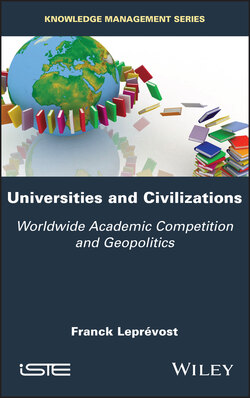Читать книгу Universities and Civilizations - Franck Leprevost - Страница 12
Оглавление
Acknowledgements
In 2016, I had the privilege of taking a sabbatical year after 10 years in top management at the University of Luxembourg (UL). This was a perfect time to take a step back (literally and figuratively, although I remained responsible for the UL international rankings) and risks (figuratively only). Specifically, I strongly wished to move out of both the thematic comfort sphere and the civilizational and cultural sphere. Taking a deep breath of fresh air and discovering what I didn’t know yet – but had long been tempted by – led me to spend about three months at the European Investment Bank (EIB) and the European Investment Fund (EIF), then almost nine months at the Peter the Great Saint Petersburg State Polytechnic University (Polytech) in Russia.
As I gradually came to understand the operating system of the EIB and the EIF, discussions with my contacts on the projects of these institutions taught me to think more holistically than I had done up to then. These exchanges also fostered the desire to structure disparate reflections on higher education and research in a broad framework. May those who made this stay possible and nurtured these discussions find the expression of my gratitude here, notably Henry von Blumenthal, Guy Clausse, Jacques Darcy, Rémy Jacob, Francisco de Paula Coelho, Fulceri Bruni Roccia, Bruno Rossignol and Marjut Santoni.
I left the world of European finance in the spring of 2016 to join the world of Russian universities. I had the chance to be a Guest Professor and Senior Advisor to the Rector of Polytech, at a time when this institution was strongly developing its national visibility thanks to the 5-100 excellence program. This stay made it possible to complete certain scientific work that had been neglected. It also provided an in vivo experience of Russian academic life. This was made possible through the following people, whom I would like to thank wholeheartedly: Andrei Rudskoy, Rector of Polytech, Dmitry Arseniev, his Vice-Rector in charge of international relations, Vyacheslav Shkodyrev, Tetiana Kovalenko, Elena Selivanova, Nikita Golovin, Yuri Klutchkoi, and the Polytech strategic planning office team.
More generally, I am indebted to the representatives of Russian higher education and research institutions for the countless discussions that have sharpened my understanding of the national academic system and the 5-100 excellence program. In particular, Alexander Shestakov, Rector of South Ural State University (one of the 21 universities in the program), Andrey Radionov, Vice-Rector, and Gleb Radchenko, Dean of the Faculty of Computer Science, helped me to understand the impact and importance of the Russian excellence program for their university located in an industrial region, far from Moscow and Saint Petersburg. Their insights were incomparably useful. I thank them warmly for this.
During the 2018–2019 academic year, the opportunity arose to contribute to the work of the expertise and consultancy mission (mission expertise et conseil – MEC) of the DGESIP1 of the French Ministry of Higher Education, Research and Innovation. This experience has enabled me to get back in touch with the higher education and research landscape of France, and to better perceive its evolutions. I would like to thank Brigitte Plateau and Anne-Sophie Barthez, the successive Directors-General of DGESIP during this period, as well as Danièle Kerneis, Head of the MEC, and all the advisers and experts both from this structure and from the Ministry more broadly, in particular Jean Bouvier d’Yvoire. This dive into France was invigorating. It provided material for a reflection still in the making on the place of academic France in international competition, but which began to be expressed in my conferences in Toulouse (annual congress of directors of services of French universities) in June 2019, and in Paris (joint DGESIP-DGRI2 conference of the Ministry) in November of the same year. May their organizers be warmly thanked here.
Thanks to my family for their help. In integrating the graphs and tables, particularly in Chapter 3 and the Appendices, my wife has taken on a dry and technical task, compensated for by the satisfaction of being at the forefront of the trends of the world’s academic elite. The sharp and uncompromising gazes of my mother and aunt reduced several adventurous initiatives in syntax, grammar and spelling to nothing.
Successive versions of this work have benefited from discussions with Phil Altbach and the attentive reading of Nicolas Bernard, Jean Bouvier d’Yvoire, Pierre-Armand Michel, Virginie Mucciante, Antoine Petit, Guy Poos, Jamil Salmi, Rolf Tarrach and Hilligje van’t Land. They are warmly thanked for the discussions about this text.
The opinions given here are, however, solely binding to the author. Including possible errors.
“To have another language is to possess a second soul,” said Charlemagne. During a stay in Ukraine, I asked Tetiana Kuchynska, then-Head of the international relations office at the Kiev Polytechnic Institute, if she knew someone who could teach the basics of Russian to a total beginner with a brain slowed down by the weight of years. Nadiia Kravchenko, a young master’s student at KPI, allowed me to take the first steps in this new language in Kiev, the cradle of Orthodox civilization and the Rus’ people. Later, in Saint Petersburg, Irina Baranova, Professor and Head of the center for learning Russian as a foreign language at Polytech, patiently pursued my initiation in to the meanders of this beautiful Slavic language for nine months. A Chekhovian trilogy for a priceless gift. Tetiana entrusted me to Nadiia. Nadiia prepared me for Irina. The three of them opened the door for me to the Russian language and thus to the Russian soul. How can I thank them?
I’m at a loss for words.
1 1 DGESIP: Direction générale de l’enseignement supérieur et de l’insertion professionnelle – Directorate general for higher education and professional integration.
2 2 DGRI: Direction générale de la recherche et de l’innovation – Research and Innovation Branch.
